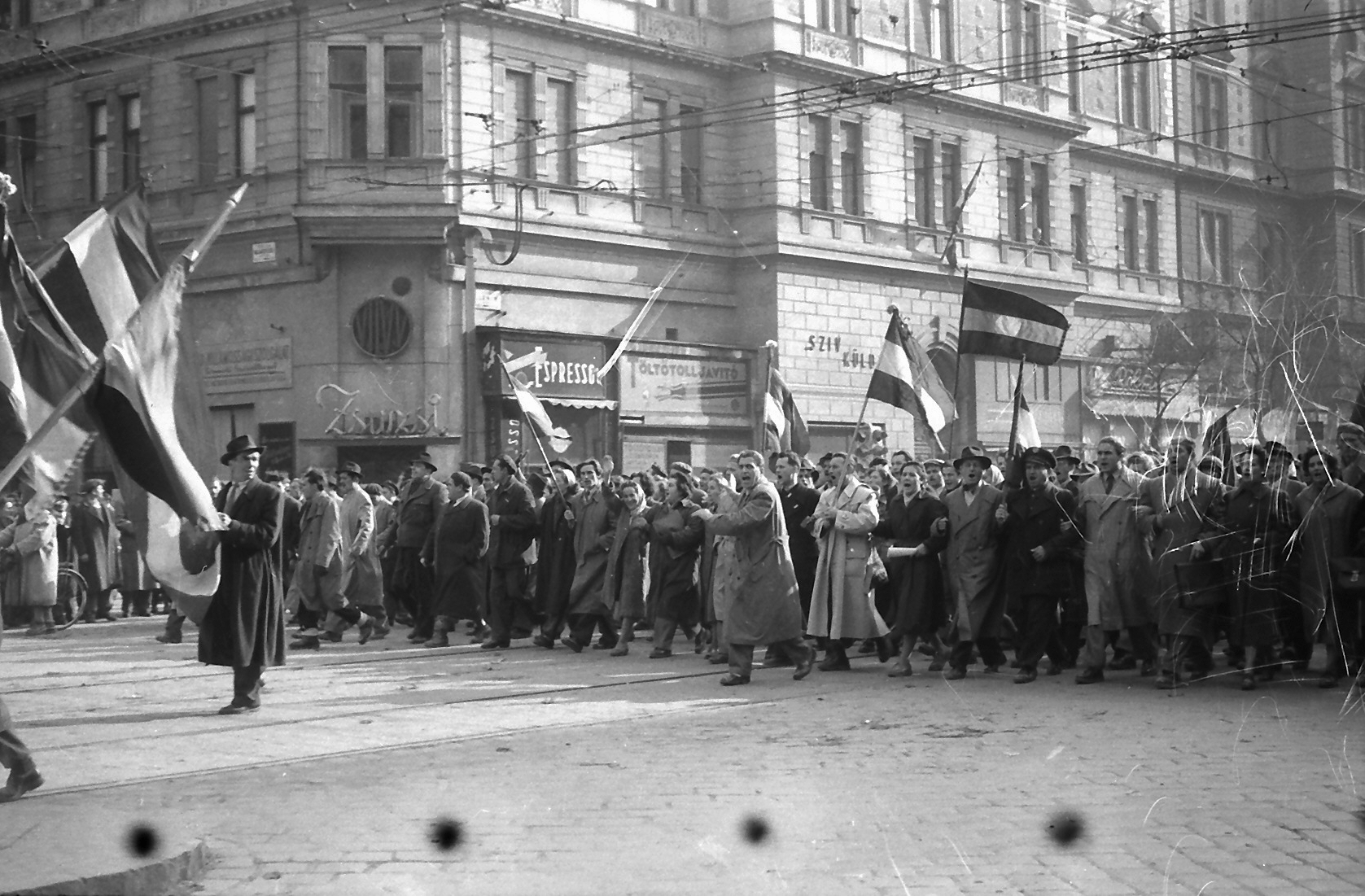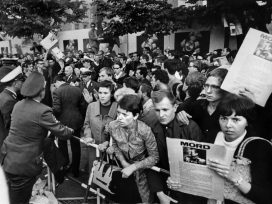A ’56er’s random notes about the ’68ers. The ’56er was twenty-something years old, so was anyone who was that sort of age in ’68 a ’68er? The same for the 1848ers and the 1919ers: the year might change, but youth is always with us.
Lukács, Marcuse and Sartre may have been old masters, but their strident disciples, revolutionary leaders, the slogan-shouting young radicals, had to lead students, and revolutionary theory had to be transformed into revolutionary practice. That was the historical necessity for you.
In the background, the faceless mass marched at the feet of a towering bronze Lenin. Metropolitan asphalt gave flower to utopia. Hitler was kaput, Stalin underground, Nixon was swaggering, de Gaulle went into a huff, Mao turned himself into a living Buddha and was still able to swim. Danny the Red’s red hair was short, cannabis had yet to reach Hungary, but the Beatles were producing a new aesthetic that went beyond jazz.

Budapest 1956. Source: Adományozó/Pesti Srác/Wikimedia.
In 1968 revolutionary romanticism was no longer cool in Budapest. Those brand-new ideals of western ’68ers had made the rounds in the eastern half of Europe twenty years before, in 1948-49. The books that the radical young of the West propagated and cited with such enthusiasm (the Marxist-Leninist classics, to use the terminology of the times) we had by then put behind us; we had read them, had been obliged to read them, they were stereotyped by then, without any of the eroticism of the new.
1956 was an internally ripened response to the charm of youth, and even if a new revolutionary romanticism was born then, by ’68 those revolutionaries, if they had not been consigned to the cemetery, after a succession of amnesties were glad to have a job and a livelihood, and they more or less unanimously resigned themselves to the language of reform. They viewed with amazement, with raised eyebrows, the raptures of western colleagues.
Let us take as an example that French revolutionary whose father was a rich financier yet, on the left wing of his Citroen DS fluttered a Soviet pennant, and on the right a Chinese pennant. If you didn’t know he was French, on the basis of his blouse and belt you would have taken him for a Russian revolutionary from Siberia and would wonder why he did not pack a pistol. He spent his childhood in the classiest arrondissement in Paris, the XVI, and had learned how to think in a world-historical perspective. When I say to him, for instance, that the cultural revolution in China had come, according to reliable estimates, at the cost of at least ten million human lives, his answer is laconic: “Who cares, if world revolution is the alternative. That still leaves plenty of Chinese.”
In the town-planning institute where I worked as an urban sociologist, I used to show off our Hungarian cities, both new and old streets, to colleagues from the West. They found the family housing of the working-class districts disappointing – not ugly or uncomfortable, but petty bourgeois. That the working class of a socialist society should yearn for the same thing as the average man in the Paris suburbs – for them that was truly depressing.
Socialism should be something entirely different from what they were familiar with, the sort that they too had. Those little family houses with the little gardens? Laughable and deplorable. The collective was OK, the individual wasn’t. We Hungarians, for our part, would have loved to cut away from the socialist camp, which they considered to be little short of betrayal. We would have approved – and we gave expression to this in 1956 – of a multiparty system, a state founded on the rule of law, and civil democracy. In the eyes of our Western friends, both male and female, that wish was a real let-down, because in their opinion civil democracy could only be called a formality, in contrast with which socialist democracy (or democratic socialism as the case may be) was a thing of substance, substantive, except none of them had the foggiest idea what that was. If everything belongs to the state, then where’s the democracy? If capital is largely in private hands, then where’s the socialism?
As a result, Chinese communes began to look glittering, especially the one to which the Chinese hosts took the benevolent revolutionary tourists to feast their eyes on. Always the same village. It was possible to scoff at the Russian kolkhozes, but not the Chinese communes. Consequently, the revolutionary dictatorships and armed resistance movements of the Third World were alluring by definition.
The holy icon of Che Guevara was everywhere; a man was not a man unless he had a beard and machine gun. And if you didn’t know how to shoot and blow things up, you could be trained at a Palestinian guerrilla camp. Proper ’68ers did not approve of the outcome of the Arab-Israeli conflict in 1967, or Israel itself for that matter, any more than its ally, the USA. It was all right, though, to like Arafat and his followers. You had nothing to hold against the fact that the greater part of the Third World fell within the Soviet and Chinese sphere of influence.
You would be delighted if you received an invitation to attend a conference of world youth in a communist country, and feel distinctly honoured if some high-ranking communist politician were there to greet you. You would dismiss the thought that you might be seen as a useful idiot: if you were an enemy of imperialism, then you were a friend of the communist bloc.
Where else were you going to get weapons and explosives if you were to switch to armed struggle? If you are a serious young German woman or man primed on philosophy, then you act consistently and do not just condemn the capitalist financial system, you kill one of its bankers. He is a relative of yours, so you can get access, and by way of thanks you shoot him down. You get on TV, as does the rectory where you grew up; your family and contemporaries at school will be questioned, the changes in your clothes and hairstyle will be on display.
If it you are itching to get away from West Berlin, where would you go? To East Berlin, obviously. Where will a Palestinian fighter receive training, medical provision, rest and recreation between two combat actions? In Budapest. One implacable hero slips another a thick bundle of dollars under the table in the Astoria coffeehouse. I not only heard about them, I saw them too. Here was where a terrorist on the Interpol wanted list could lie low. He would be given a controller, a minder, by the Hungarian political police; someone to take care of him, look after his wellbeing, provide addresses and maybe instructions, establish contacts.
Yet those were still friends; we may not have seen eye to eye, but we were similar in many respects. Hair, clothes, tastes, smile, reading matter, the tunes we hummed, thumbing lifts, our manner of conducting love affairs, often the need to rough it, our readiness to sleep anywhere. If we were cooking spaghetti for ourselves, a generous helping could always be spared for them, and a familiar rock-band would be playing from the record-player. The hung-up should loosen up, the buttoned-up should use the familiar “tu“, an outsider should have no wish to fit in. Jump the red light, as the artist Tamás Szentjoby said. You don’t like it if someone enters the bathroom while you are in the bathtub? Are you mad? Do you lock the door when you’re in the toilet? Don’t be so dopey, we’d do better to take the door right off. So they see you straining when you’re taking a crap! At least it’s honest.
But if the movement requires you to go around in the latest fashions and drive a flash car, that too is fine, you could do that too. Your parents? Another world. You left that; they too might be useful idiots for you. Middle-class good manners? Odious, bogus and ridiculous. Homo-eroticism: why not? After all, when you get down to it, humans are androgynous. A private life? A bourgeois fiction and selfishness; better to choose a commune, a clandestine cell, the ashram or a Buddhist or Muslim religious community, perhaps even the brotherhood of ex-cons. Jump out from your established position; begin again at the beginning, naked.
There were plenty of ideas, but sharp-eyed perceptions as well. For instance, the fact that the previous generation, the parents and grandparents, had fitted cosily into the Third Reich, made money on it, and a Jewish overcoat and sideboard had once, all of a sudden, appeared, found their way into the home. Once an appurtenance of a father’s authority was that he stood his ground in uniform and did his duty. If ordered to shoot, he shot, and if his hands were shaky at first, he would steady his nerves with a tot of schnapps. And he would bring home bits of this and that, but then the Anglo-Saxons bombed the family nest.
Victory may have failed to come about, but Germany came out a winner in the reconstruction, the economic boom. The new world could not come fast enough. Because for something like two decades after the war, the existing, the rancid breath of the Nazis, and the world that preceded them, continued to foul the air both at home and at school. That was until youngsters blessed with the grace of being born later resolved to take up something new and, moreover, do something about it. And younger people everywhere, from San Francisco to Paris, said the same. News, ideas and events, pictures and songs, raced round the globe, and although people may not have been able to radically revolutionise the hardware of social structures, they thoroughly overhauled and updated the software of cultural values and styles.
Bolshevik phantasms made way to greater respect for human rights, or in other words the liberal world of ideas, which in its turn removed from the scene (or at least the surface) national socialism and all that went with it. A new, democratically based consensus was needed for the newer chapter in the story of modernisation. A newer wave of European humanism, which resolved political relations in collegial dialogue, washed away the stiffnesses of war and enmity, and, after a fashion, squeezed the cult of violence from the centre to the sidelines. It was quite possible, of course, to stay outside this substantive and stylistic consensus and thereby slip to the European periphery, in the same way as one can choose to be sick.
A wolf cub needs to bleat. Or to transfer the tension into art – in a word, to become civilised. This is what makes European union possible, with ’68ers taking a leading role both as protagonists and ideologists. It is a normal process for headstrong striplings to mature into level-headed statesmen, or to put their talents to use outside politics. One way or another, their names and faces will figure if the talent stood the test of time: it was a good brand, and it kept on pulling in an audience.
But should the young radical become a grandma or grandpa who has more or less come to the end of what they had to sing, and has taken more than enough twizzles on the stage, even if there are still youngsters for whom the name may still ring a bell, they can declare that they have done their bit, the job is done. And even if it is not completely free of a somewhat tart after-taste, seventy-year-olds raise their hats admiringly to the clichés of the evergreen youth culture, the swift pace of life. The way I see it, even oldsters do not throw in the towel, and they let the world know that they know what they know, and they set in motion an arsenal of appropriate instruments.
Europe’s eastern half also had its ’68ers, no less important than those in the West; they mutually inspired each other. The eastern European ’68ers formed the backbone of the democratic opposition and dissidents, whereas we, the somewhat older ’56ers, only joined in with certain reservations, because we had a closer acquaintance with defeat. Nor were we so carried away by the thought that we might even win out, because we were also familiar with the stupidities and darker sides of victory. But more about the ’68ers of central and eastern Europe another time. My esteemed ’68er younger brothers and sisters, both in the West and the East, I extend to you a hand of friendship.








